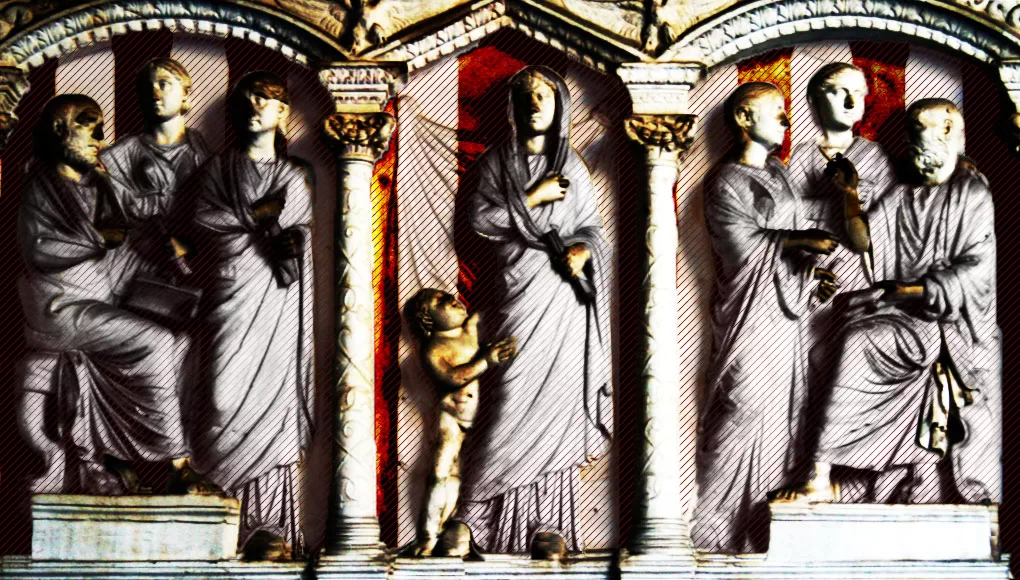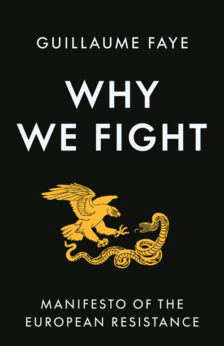One of the perils which menace all reaction against the forces of disorder and of corruption that are devastating our civilization and our social life, is the tendency of that reaction to end up in forms which are little more significant than those of mere bourgeois domesticity. More than once have we heard denunciations of the decadent character of moralism in comparison to every superior form of law and of life. In truth, if an ‘order’ is to have value, it must signify neither routine nor depersonalized mechanization. There must exist forces in it which are originally untamed, and which conserve in some way and to some extent their nature even in the most rigid adherence to a discipline. Only then does order become fecund. We could express this in an image: an explosive and expansive mixture, when constrained to a limited space, develops its efficacy to the extreme, while if it is placed in boundless space it almost dissipates. In this sense, Goethe could speak of a ‘limit which creates’, and could say that in the limit the Master is shown. It is also necessary to recall that in the classical vision of life the idea of the limit – πέρας1 – was taken as perfection itself, and was posited as the highest ideal, not only in ethical terms, but even in metaphysical terms. These considerations could be applied to a variety of domains. In the present essay we consider a particular case: that of the family.
The family is an institution which, eroded by the latest cosmopolitan civilization, undermined at its foundations by the very premises of feminism, of Americanism and of Sovietism, wants rebuilding. But even here the alternative indicated above arises. Institutions are like rigid forms in which an originally fluid substance has crystallized: this is the original state that one must reawaken, whenever the inherent vital possibilities of a specific civilizational cycle appear to be exhausted. Only a force which acts within, as something which gives meaning, can be creative. Now, what meaning must one find in the family? In the name of what must one desire it and preserve it? The usual, bourgeois and ‘respectable’ meaning of this institution is known to everyone, and it is less worthwhile to point it out, than to observe the wholly insufficient support it might furnish to a new civilization. It might be well to safeguard the existing vestiges, but it is useless to hide the fact that this is not the real pith of the matter, that this by itself is just another ‘too little’. If one wishes to find one of the earlier causes of the corruption and the dissolution of the family which have arisen in the most recent times, it can be indicated precisely in the state of a society wherein the family is reduced to signifying nothing more than convention, bourgeois respectability, sentimentalism, hypocrisy and opportunism.
Here as elsewhere, simply by carrying ourselves directly and resolutely, not merely to yesterday, but to the origins, we can find what is truly requisite. And these origins should be accessible to us, particularly if our Roman tradition of the family stands among those that have brought the highest and most original expression of the concept.
According to the original conception, the family is neither a naturalistic nor a sentimental unity, but an essentially heroic unity. It is known that the ancient denomination of pater derives from a term which designated the leader,2 the king. The unity of the family already for this reason appeared therefore as that of a group of beings joined in virile manner around a lord, who to their eyes appeared invested with a brute power, but also with a majestic dignity, such as to arouse veneration and fidelity. This character of the family is moreover confirmed if one recalls that in the Indo-European civilizations the pater – as well as the leader – is the man who exercised an absolute rulership over his kith and kin, insofar as he was at the same time absolutely responsible for his kith and kin before every superior hierarchical order; he was also the priest of his gens,3 for he more than any other represented his people before the divinities; he was the custodian of the sacred flame, which in the patrician families was the symbol of a supernatural influence invisibly joined to the blood and transmitted with the same. No soft social sentiments nor conventionalism, but rather something between the heroic and the mystical therefore grounded the solidarity of the familiar or popular group,4 transforming it into a single unified thing through relations of participation of virile dedication, such that it was ready to rise up united against whomever might injure it or offend its dignity. With good reason did de Coulanges,5 in his studies on this matter, conclude that the ancient family was a religious unity first, and only secondarily a unity of nature and of blood.
That marriage was a sacrament long before Christianity (as for example in the Roman ritual of confarreatio)6 is perhaps already known to the reader. Less known, however, is the idea that this sacrament did not hold as a conventional ceremony or as a juridico-social formula, but rather as a kind of baptism which transfigured and dignified the woman, bringing her to participate in the same ‘mystical spirit’ of the people of her spouse. According to one Indo-European rite, itself very expressive as a symbol, before marrying, the woman was Agni, the mystical fire of the house. Now, this is no different from the original presupposition, by which the husband was identified with the Lord of the woman; bourgeois fidelity is naught but the decadent and debilitated derivative of this original relationship. The ancient dedication of the woman, who gives everything and asks nothing, is the expression of an essential heroism – much more mystical or ‘ascetic’, we are tempted to say, than it is passionate or sentimental – and, in any case, transfiguring. According to an ancient saying:
There is no special rite or teaching for the woman. Let her venerate her husband as her god, and she will obtain her own celestial place.
We can almost find a parallel here with the conception of another tradition, according to which the Solar House of immortality was reserved, not only for the warriors fallen on the field of battle and for the lords of divine lineage, but also for the women who died bringing a son into the light of day: this was seen as a sacrificial offering, an offering as transformative as that brought by the heroes themselves.
This could bring us to consider the very meaning of generation itself, but that topic would lead us too far astray. Let us recall only the ancient formula according to which the first-born son was considered to be the son, not of love, but of duty. And this duty was, once again, of character both mystical and heroic. It was not a matter only of creating a new rex for the good and the strength of the family,7 but also of giving life to him who could absolve his people of their mysterious obligation to the ancestors and to all those who produced large families (in the Roman rite, these were often recalled in the form of innumerable images held aloft carried during solemn occasions), symbolized by the perennial familial flame. Therefore, in not a few traditions we find formulae and rites which bring to mind the idea of authentic conscious generation – generation, not out of a dark and semiconscious act of the flesh, but through the body and at the same time through the spirit, literally giving life to a new being; with regard to his invisible function, it was even said of this being that by virtue of his existence the ancestors would be confirmed in immortality and glory.
From these testaments, which are but a few from among the great many that could easily be gathered, issues a conception of familial unity which, as it stands beyond every conformist and moralist bourgeois mediocrity, and every abusive individualistic presumption, stands equally far removed from sentimentalism, passion and everything relating to brute social or naturalistic facts. The family receives its highest justification when set upon a heroic foundation. To comprehend that individualism is not a strength, but a renunciation; to recognize in the blood a steadfast basis for family; to articulate and to personalize this basis through the force of obedience and of command, of dedication and affirmation, of tradition and of a solidarity which we will go so far as to call warlike, and, finally, to personalize it also through a force of intimate transfiguration – only by all of these means will the family come once more to be a living and powerful thing, the first and essential cell for that highest organism, which is the State itself.
References
1Ancient Greek for ‘limit’, ‘boundaries’, ‘extremities’; hence the perfection of a thing, its end or its object. Hence also a final decision. (All footnotes are translator’s.)
2The word here translated ‘leader’ is duce in the Italian, from the Latin dux. It means he who guides, he who leads, he who commands; it is obviously etymologically connected to our English ‘duke’, and in modern times has most famously been associated with Mussolini, known universally as il Duce during the Ventennio, the twenty years of Fascist rule.
3Latin for ‘people, populace, folk, race’, originally ‘generative power or origin’. The centrality and extent of this term can be indicated by noting several of the English terms which derive from it: geniality, genius, ingenuity. Evola makes some brief observations on the Roman concept of the gens in The Bow and the Club (Arktos, 2018), pp. 41–42. The Italian gente, ‘people’, is obviously directly derived from it, and wherever this word appears in the present essay I have translated it with ‘people’. The temptation to use our word ‘folk’ has been resisted on account of its radically different etymological weight; it was originally connected to the concept of the warrior. (It might originally have meant a ‘host of warriors’.)
4Italian: gruppo familiare o gentilizio; that is the group based on family ties or ties of gens (see footnote 2 above).
5Numa Denis Fustel de Coulanges (1830–1889) was a French historian, whose best known work, also his first, is probably that alluded here by Evola. It has been translated into English as The Ancient City, an overview of the religions, laws and customs of the ancient Greek and Roman civilizations.
6The confarreatio was a patrician form of marriage, noteable in the present context for its religious and spiritual overtones. For instance, a woman could only become a Vestal Virgin if she were born of parents wed through the confarreatio, thus indicating that it was connected with a certain view of spiritual purity. It is also noteworthy (given the prequel here) that it was at least originally considered indissoluble – something of a rarity in marriage rites, which, until what can rightly be regarded as the Christian revolution in marriage, tended (to greater or lesser degrees) to permit divorce under well-defined conditions.
7Italian: ceppo. This word has a much wider acceptation than mere family, meaning as it also does ‘lineage’, ‘stock’ and ‘family’ in the more scientific sense of a group of genetic relations.








Evola’s right. I didn’t know about this idea and have been considering it since reading this. It reminds me of the Mormon concept of a woman going to Heaven based on her husband’s judgement. Something does feel right about both concepts.